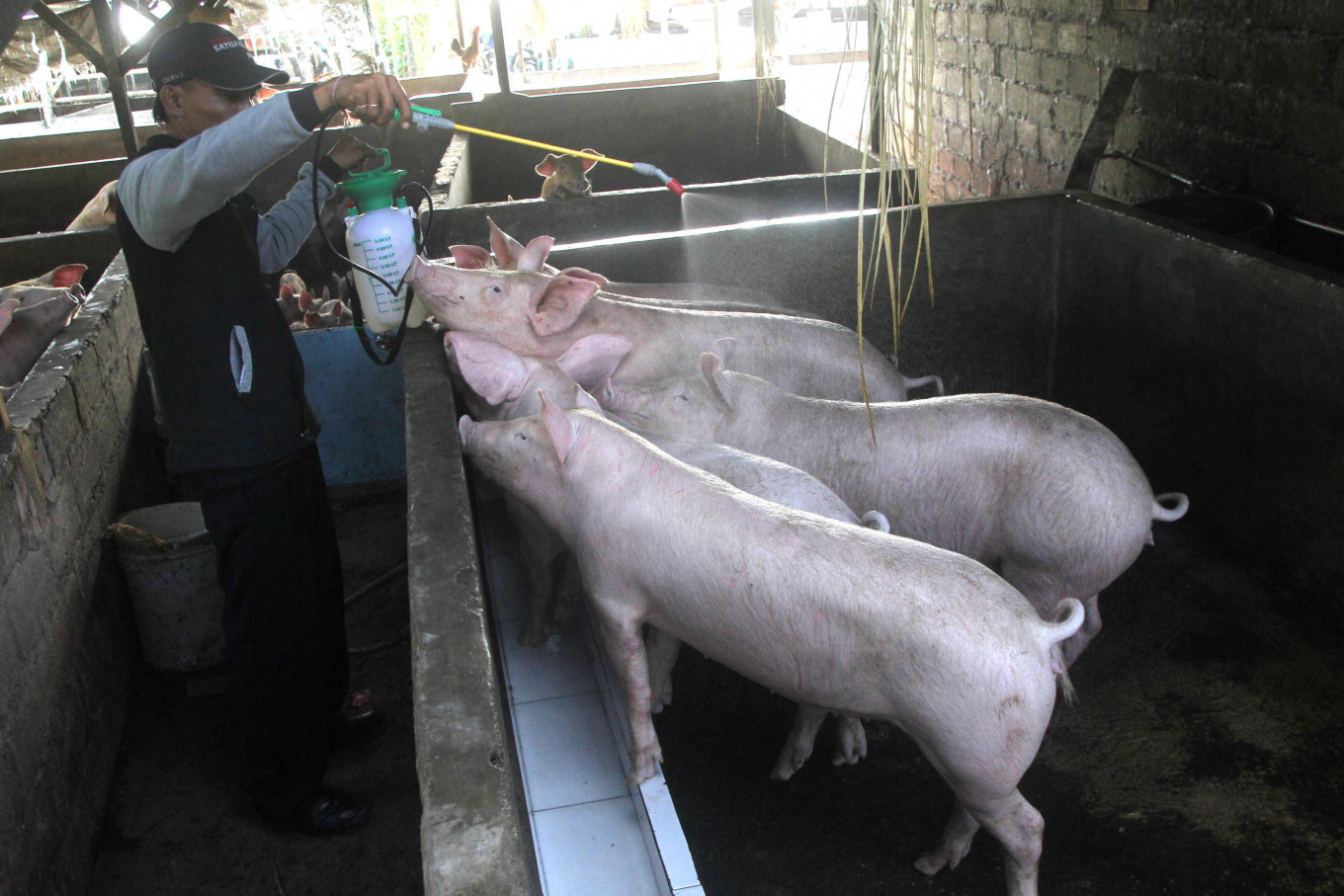Popular Reads
Top Results
Can't find what you're looking for?
View all search resultsPopular Reads
Top Results
Can't find what you're looking for?
View all search resultsHundreds of pigs in Bali killed by mystery disease
Pig farmers are concerned that the disease is related to the African swine fever outbreak that has resulted in the deaths of almost 50,000 pigs in North Sumatra over the past few months, but Balinese officials have yet to confirm the suspicions, saying they are awaiting the results of laboratory tests.
Change text size
Gift Premium Articles
to Anyone
 I Putu Eka Dharmana, a doctor from the Department of Agriculture and Food Health of Denpasar City, sprayed disinfectants into the pig pen in Denpasar, Bali, Thursday, 04/02/2020. According to data from the Department of Agriculture and Food Security of Bali Province, 888 pigs died suddenly and the cause is still unknown. (JP/ Zul Trio Anggono)
I Putu Eka Dharmana, a doctor from the Department of Agriculture and Food Health of Denpasar City, sprayed disinfectants into the pig pen in Denpasar, Bali, Thursday, 04/02/2020. According to data from the Department of Agriculture and Food Security of Bali Province, 888 pigs died suddenly and the cause is still unknown. (JP/ Zul Trio Anggono)
Nearly 1,000 pigs in Bali have died from an as-yet-unidentified disease, local authorities say.
Pig farmers are concerned that the disease is related to the African swine fever (ASF) outbreak that has resulted in the deaths of almost 50,000 pigs in North Sumatra over the past few months, but Balinese officials have yet to confirm the suspicions, saying they are awaiting the results of laboratory tests.
According to Bali’s agriculture and food security agency, at least 888 pigs have died from the disease within the last two months.
Instances of the disease have appeared in seven regencies: Badung, Tabanan, Denpasar, Gianyar, Denpasar, Karangasem and Bangli. Badung regency recorded the highest number of deaths with a total of 598 dead pigs, followed by Tabanan with 219, Denpasar with 45 pigs, Gianyar with 24, Bangli with one and Karangasem, also with one.
I Wayan Masa Tenaya, the head of Denpasar’s Veterinary Research Center, said that blood samples from the dead pigs had been sent to the Medan Veterinary Research Center in North Sumatra to get tested, after initial tests ruled out the three common diseases that usually afflicted pigs in Bali, namely septicemia epizootica, hog cholera and streptococcus suis.
Read also: Over 40,000 pigs killed as African swine fever outbreak in N. Sumatra worsens
“The laboratory in Medan has more equipment and they have more experience identifying pig diseases,” Masa Tenaya said.
He added that he had yet to receive the test results from Medan and thus could not yet confirm whether the pigs were afflicted by ASF.
Despite the lack of confirmation, Bali Pig Farmers Association (GUPBI) chairman Ketut Hari Suyasa said the association strongly suspected the new outbreak was indeed ASF.
“All diseases that affect pigs share many similar symptoms,” he said. “However, in this case, we suspect that this is African swine fever because most pigs have been vaccinated for the other diseases.”
He added that the association had already been working on preventing the spread of the disease.
“We have warned all farmers to increase their biosecurity measures to prevent the disease from attacking the whole pig population on the island. If all pigs get infected by the disease, it will result in an bad economic hit for the farmers on the island,” he said, adding that the GUPBI was focused on ensuring that the disease did not spread to the currently unaffected regencies in the province.
Read also: Swine fever may affect millions of people in Indonesia
Bali agriculture and food security agency senior official IKG Nata Kesuma told The Jakarta Post on Monday that the disease’s mortality rate was relatively low compared to the total population of pigs across the island, which is about 800,000.
“Following the outbreak, we have intensified our attempts to prevent it from contaminating other pigs. We are happy that there are have been no more reports of pig deaths within the last six days,” Nata Kesuma said. “We try to educate farmers to increase their awareness of the importance of biosecurity, keeping the pig cages clean and how to manage dead pigs to prevent other pigs from being contaminated.”
Nata reiterated that there was no confirmation yet about what the disease was.
“So far, we haven’t received the [laboratory] results. However, the most important thing is that we keep working to stop the spread of the disease,” he said. (kmt)









